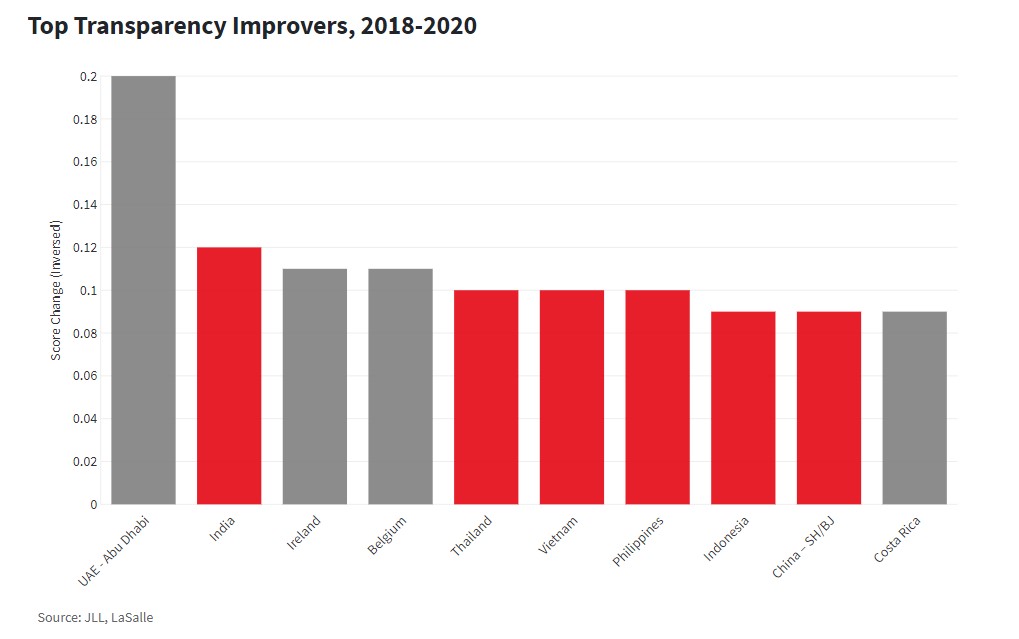Real estate transparency is an essential ingredient of a well-functioning economy and society and therefore touches on multiple aspects of life.
JLL recently published its latest Global Real Estate Transparency Index, a biennial survey of the world of real estate transparency. The 2020 Index was compiled at a time of massive economic and societal disruption during which governments, businesses and communities grappled with the impacts of COVID-19.
In the newly released biannual survey, Thailand is ranked 33th, a slight improvement from the 2018 edition of the Index where the country was ranked 34th, but a measurable step in the right direction compared to the 2016 ranking (38th).
Furthermore, that small improvement has pushed Thailand into a higher tier, namely from the ‘Semi-Transparent’ to ‘Transparent’.
There are no Asian countries classified in the ‘Highly Transparent’ tier, and only seven in the ‘Transparent’ Tier.
Singapore is the best performer among Asian countries (14th), closely followed by Hong Kong (15th) and Taiwan (23rd) weirdly referenced as “Chinese Taipei” in the JLL publication.
Then there is Malaysia (29th) and South Korea (30th) followed by China (Shanghai and Beijing) and Thailand respectively in 32nd and 33rd position.
Transparency is improving, but not fast enough
The latest survey results, covering 163 cities in 99 countries and territories, tell us that improvements to real estate transparency continue to be made across the globe.
However, overall progress is still not fast enough for a society demanding ever higher ethical standards and one in which businesses are being held to account to invest and operate transparently and sustainably.
Thailand is among the top global improvers powered by sustainable moves
Abu Dhabi emerged as the top global improver in 2020, with its score boosted by government initiatives to improve corporate and real estate sustainability, while Thailand ranks fourth.
Asia Pacific markets have led advances globally, with many of the top improvers concentrated in South and Southeast Asia.

In Southeast Asia, Thailand, Vietnam, the Philippines and Indonesia are all among the global top 10 improvers. Progress in Thailand and Vietnam’s main cities, Bangkok and Ho Chi Minh City, has pushed each into a higher tier – ‘Transparent’ and ‘Semi-Transparent’ respectively.
India has registered one of the largest improvements globally, edging into the top 20 for sustainability transparency through the active role of organizations like the Indian Green Building Council (IGBC) and Green Rating for Integrated Habitat Assessment (GRIHA).
Meanwhile, in mainland China improvements continue inmarket data, the active proptech sector, more coordinated land-use planning, and a wider adoption of green and healthy building standards.
What does the 2020 Index tell us?
The 2020 Index reveals that transparency is progressing across most countries and territories, but overall improvement is the weakest since the period directly following the Global Financial Crisis.
The leading Anglophone countries continue to dominate the top ranks, with the United Kingdom, Australia and the United States taking the top three positions. However, several Western European markets including France, Germany and Sweden are catching up.
Transparency has been boosted in these ‘Highly Transparent’ markets by a combination of proptech and new data, sustainability initiatives, anti-money laundering regulations and enhanced tracking of alternatives sectors.
About the author
Bangkok Correspondent for Siam News Network. Editor at Thailand Business News







